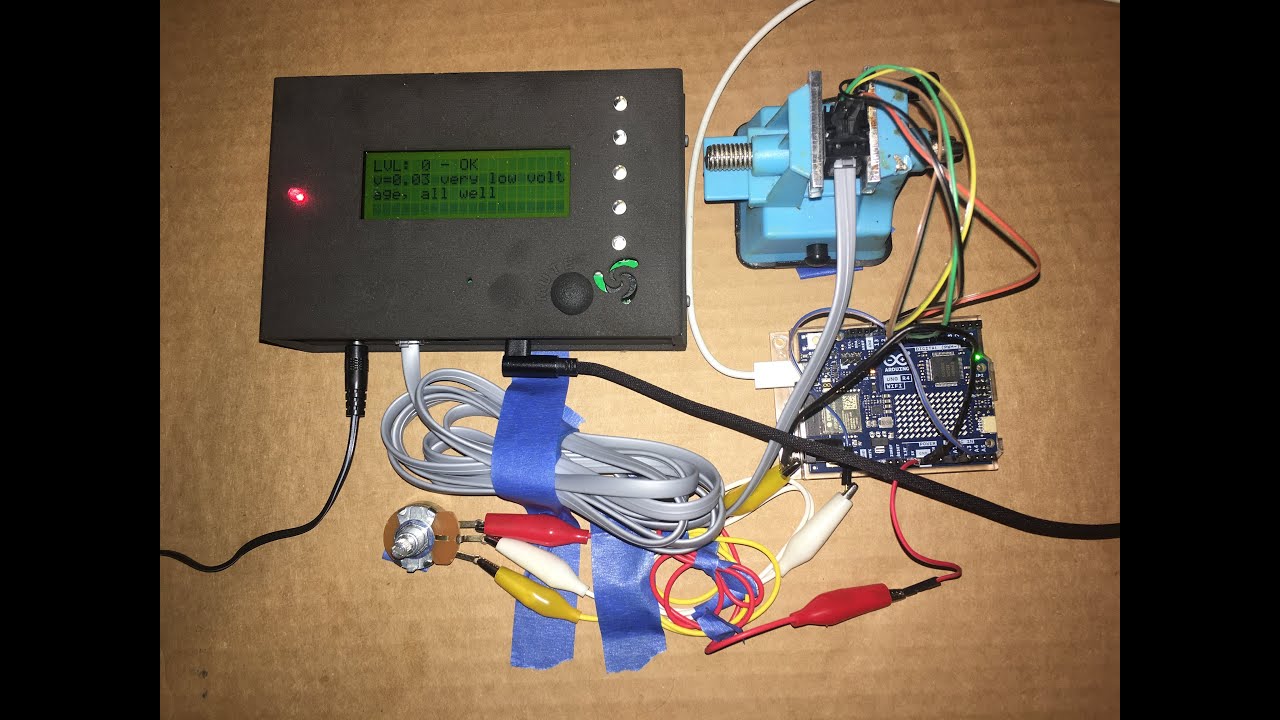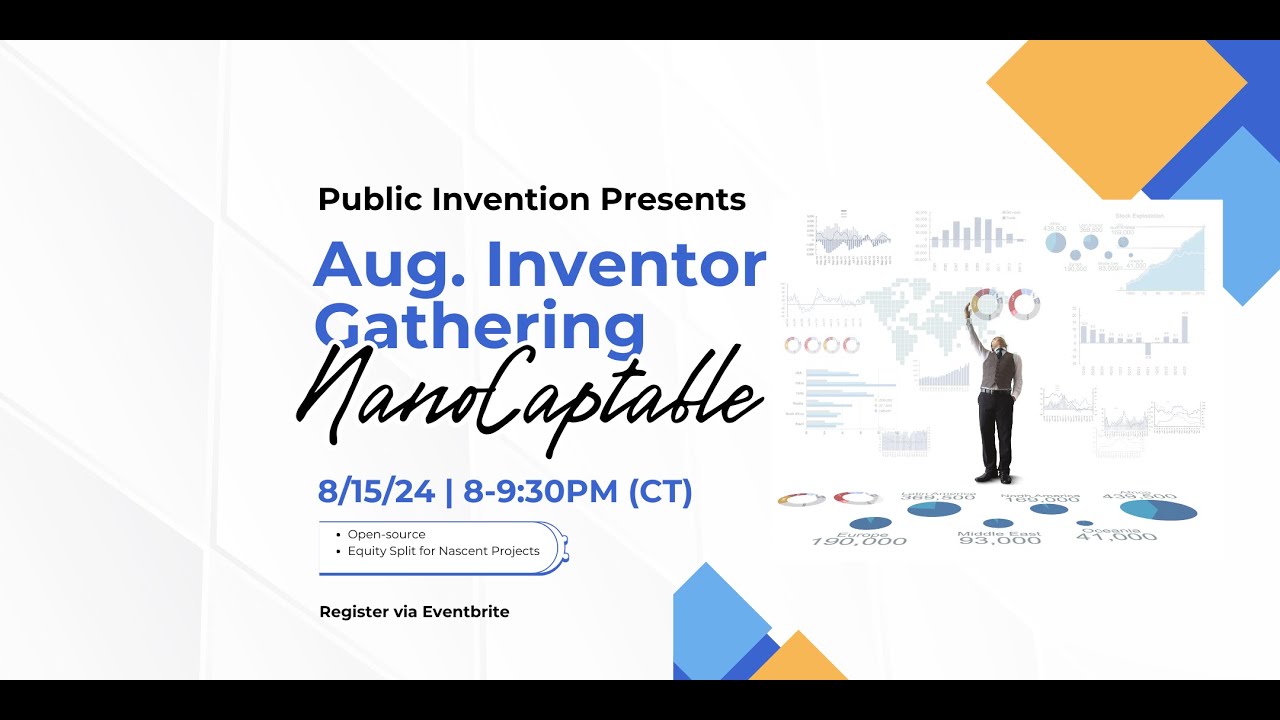Why Public Invention Matters to the Future
Invent things that help humanity
We challenge the notion that inventions should be reserved for patents and profits. Rather, we invite fellow builders of the future to use their skills for a humanitarian purpose. We want to make the future better for everyone. To do this we remove, rather than add, legal barriers to the free use of our inventions. All work done with Public Invention is free and open to all under share-alike public licenses.
Project Dashboard
Check out our dashboard for project updates and accomplishments:
| Active Projects | Inventors | Sept 2025 | Oct 2025 | Nov 2025 | Dec 2025 | Jan 2026 | Feb 2026 | Mar 2026 | Apr 2026 | May 2026 | June 2026 | July 2026 | Aug 2026 |
|---|---|---|---|---|---|---|---|---|---|---|---|---|---|
| GDT | Victoria, Christina, Vincent, Deneille, Surya, Jara, Alison, Divya, Lywelyn | Development of API | Notification system, finish API | Notification System, API to Doctors Without Borders (MSF) | Finish API for MSF, Begin Notification | TBA | TBA | TBA | TBA | TBA | TBA | TBA | TBA |
| LibRecorder | Avinash, Megan, Roy, Nipul, Sanchay, Guillaume | Lit. review, architecture, prototype | Apply machine learning | End-to-end platform build out | Finish first paper, Add image classifiers | TBA | TBA | TBA | TBA | TBA | TBA | TBA | TBA |
| NASA Oxygen | Lee, Lawrence | Research and writing of Phase 1 | 3000 psi planning | Heat transfer and RF heating | Decide equipment to test RF Heating | TBA | TBA | TBA | TBA | TBA | TBA | TBA | TBA |
| KidsOR Oxygen | Lee, Lawrence, Courtney | Component failure repair | Restart-experiment | Waiting on others | Waiting on equipment | TBA | TBA | TBA | TBA | TBA | TBA | TBA | TBA |
| Krake | Nagham, Lee, Courtney, Yehia, Juhandre | Ordered new boards! Enclosure Design | Speaker enclosue and software | New boards and speaker enclosure | Test new speakers | TBA | TBA | TBA | TBA | TBA | TBA | TBA | TBA |
| EcoPot | Cledden, Ivan, Gianluca | OpenFOAM simulaton of flat vs. found, boil in mini-pot | Test apparatus, side-by-side tests | Testing flow hypothesis, heat transfer fins | Work on paper with A-B testing, make "Wavy" Pots | TBA | TBA | TBA | TBA | TBA | TBA | TBA | TBA |
| Biochar Toilet | Nupur, Hardhik | Initial hardware and design | Test drying (low pressure and temp) | Still trying to build first prototype | Buy crucible for inductive heating, integrate | TBA | TBA | TBA | TBA | TBA | TBA | TBA | TBA |
| Moonrat | Melanie | Paper writing | Submit paper to HardwareX | Final enclosure tweaks | Finish the paper | TBA | TBA | TBA | TBA | TBA | TBA | TBA | TBA |
| Alarm Dialog Manegment (ADaM) | Saicharan, Muhammad | Research related research | Tie software to Krake | Improving architecture | Create working prototype | TBA | TBA | TBA | TBA | TBA | TBA | TBA | TBA |
| Ferrofluid Pump | Asmi, Anson, Asim | Plan new approach | Simple piston test | Need to improve magnets | Test "boat" pump | TBA | TBA | TBA | TBA | TBA | TBA | TBA | TBA |
| Kea | Ben | Initial work for Arduino and Linux done | "Tasks" and Scheduler integrated | Integrate with COG | Integrate with COG | TBA | TBA | TBA | TBA | TBA | TBA | TBA | TBA |
| Partially Active Projects | Inventors | Sept 2025 | Oct 2025 | Nov 2025 | Dec 2025 | Jan 2026 | Feb 2026 | Mar 2026 | Apr 2026 | May 2026 | June 2026 | July 2026 | Aug 2026 |
|---|---|---|---|---|---|---|---|---|---|---|---|---|---|
| Number Spectra | TBA | Project Restart | No changes | No changes | No changes | TBA | TBA | TBA | TBA | TBA | TBA | TBA | TBA |
| Ferrofluid Checkvalve | Joe, Rob | No changes | Rob to finish theory section | No changes | No changes | TBA | TBA | TBA | TBA | TBA | TBA | TBA | TBA |
Inventor Gatherings
Check out our free, monthly Inventor Gatherings: virtual events held every third Thursday at 8:00 PM (CDT), where STEM professionals, students, and innovators connect to share ideas, spark collaboration, and support open innovation. These inclusive sessions feature engaging discussions, special guests, and opportunities to grow your network.
Last Gathering: GreenLathe Collaborative: A Solarpunk Collective - Dec 18, 8-9:30PM (CDT)
Volunteer with Public Invention
Public Invention forms invention teams around humanitarian invention projects. We also need Invention Coaches above all else to mentor and guide a project from start to finish. However, we also need artists, writers, social media experts, and more. All will find a place here and all kinds of tech backgrounds can be utilized: biology, mechanical engineering, electrical engineering, computer science, math, etc.
Different backgrounds with these interest are more than welcome to join our team!
Donate
Your donation directly supports essential activities, including travel to research conferences, journal submission fees, materials for project teams, and the technology needed to bring new inventions to life.
We invite you to contribute to our work and help drive innovation forward.
Public Invention became registered 501(c)(3) nonprofit since November 2019.
Recent Projects
Check out some of our recent public invention projects listed below.
Not sure where to start? Chat with our Project Chatbot to explore active inventions based on your interests and skillset.
PolyVent
The COVID-19 pandemic has underscored the fragility of our global supply chains. The PolyVent started out as an attempt, along with 100 other teams, to make an open source emergency ventilator. It has now become the world’s most open and extensible ventilator.
GOSQAS
The Global Open Source Quality Assurance System (GOSQAS) provides the opportunity to create truthful, transparent documentation via our open source provenance tracker, Global Distributed Tracking (GDT). Designed specifically for low-resource settings, GDT allows anyone with simple website access to securely record their project data.
Fetal Health Risk Detection using Machine Learning
Equipping healthcare professionals and expectant mothers with timely and actionable insights, this solution aims to transform neonatal care, saving lives and fostering healthier beginnings.
Project #51: Moonrat: A portable Incubator
Current Public Inventors:
Melanie Laporte, Silvia Castillas, Harshit Kumar, Enrique Ruiz, Horacio Garcia, F. Lee Erickson, Robert L. Read of Public Invention
Past Inventors: Sam Dauenbaugh, Jerry Chang, Shreya Bhatia
NASA-MCOG
The NASA-MCOG project develops an open-source control system to enhance NASA’s Ceramic Oxygen Generation technology, aimed at improving life support for space missions. The project focuses on precise parameter control, with potential applications for global health and oxygen generation in harsh environments.
Check out how the efforts of this project are helping other organizations, like KidsOR, to bring oxygen generating sources to low income countries to save lives: https://www.kidsor.org/news/nasa-kidsor/







